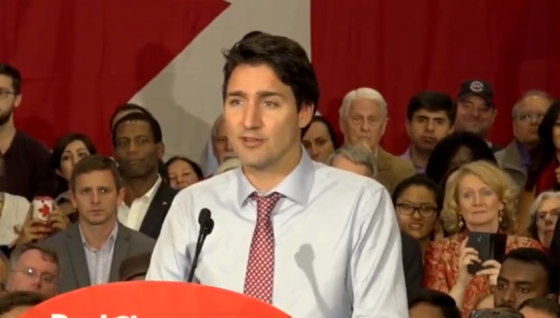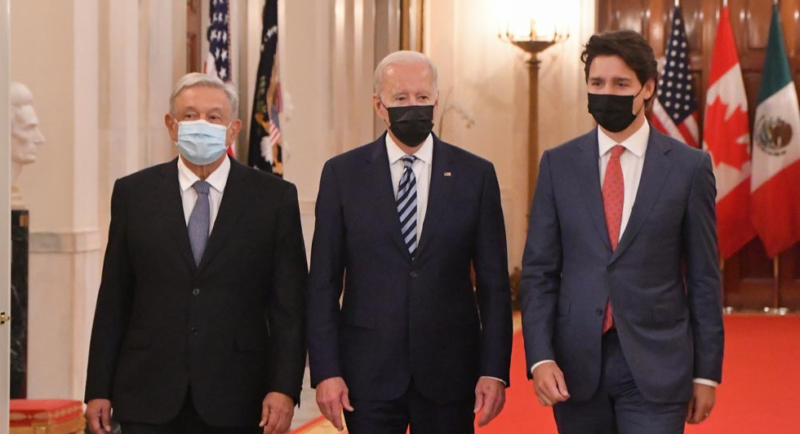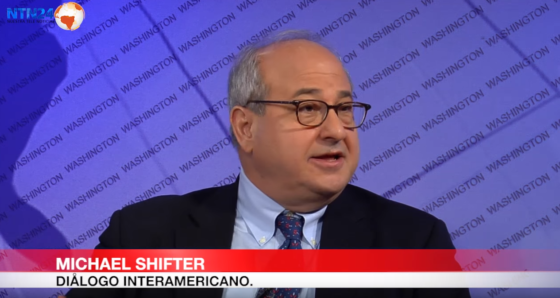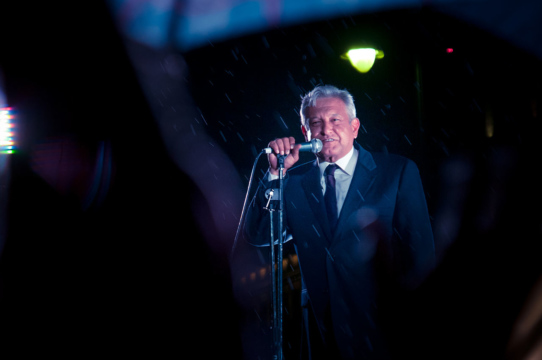
What Will Trudeau & the Liberals Bring to Canada?
What do the results mean for businesses in Canada, and which sectors will be most affected?
A Daily Publication of The Dialogue
U.S. President Joe Biden, Mexican President Andrés Manuel López Obrador and Canadian Prime Minister Justin Trudeau met on Nov. 18 in Washington to discuss economic integration in North America. It marked the first time since 2016 that the three countries’ leaders have met for the so-called Three Amigos Summit. What were the most important advancements that came out of the meeting, and what challenges remain? What is the status of one of the main economic sticking points among the countries—a proposed U.S. electric vehicle tax credit that is intended to favor unionized manufacturers that are based in the United States? How well are the three countries working together on migration?
Michael C. Camuñez, CEO of Monarch Global Strategies, former U.S. assistant secretary of commerce and principal architect of the U.S.-Mexico High Level Economic Dialogue: “The North American leaders should be given credit for achieving an important public diplomacy ‘win’ by affirming the value of the North American partnership. Regrettably, that appears to be the extent of their ambition. For starters, one could discern no clear priorities for the meeting, as evidenced by the joint statement, which included everything except the kitchen sink. Yes, the relationship is complex, but the times require an urgent focus on the most critical challenges we face as North America—from the existential threat of climate change to a fierce economic battle with China. Yet the summit produced very little other than the same rhetorical pledges to ‘deepen our integration and cooperation,’ with few concrete commitments. Speaking of rhetoric, the disconnect between what was said, especially by AMLO’s public opening remarks, and the reality on the ground in Mexico, was truly breathtaking. Anyone trying to do business in Mexico right now was left scratching their head given the challenges in a rapidly deteriorating business climate that shows no signs of improving. The Canadians appeared ready to speak truth to power—challenging U.S. protectionist policies in the electric vehicle manufacturing sector—but there is no indication the United States followed suit, especially with respect to the energy counter-reform that could well be adopted in Mexico and the calamitous environmental and economic consequences it threatens. If, as AMLO purportedly stated to his counterparts, the leaders were ‘speaking the same language, though in a different tongue,’ then the North American Leaders’ Summit looks regrettably like an economic Tower of Babel. Until we can talk honestly, as amigos, about our common challenges and concerns, we will be resigned to watch China eat our lunch.”
Arturo Sarukhan, board member of the Inter-American Dialogue and former Mexican ambassador to the United States: “Two drivers triggered the reconvening of the summit. The first was Biden’s laudable efforts to rescue and reconstruct the institutional framework of U.S. diplomacy. That the summit occurred after a five-year hiatus at a time of ongoing disruptions to joint supply chains and production platforms in North America, a pandemic, the race against climate degradation and an unprecedented number of people on the move—migrants and refugees—across the Americas was prescient. As Washington recalibrates its relationship with China, it will hopefully help underscore to U.S. policymakers that that goal will only be achieved if Mexico and Canada are an integral part of the strategy, particularly regarding trade, ally-shoring, the digital economy and cybersecurity. Second, whereas in the past Canada tended to resist the trilateralization of North American ties (because, the thinking went, it subtracted from its relationship with Washington) and Mexico tended to foster it (to provide a united front vis-à-vis a common neighbor), this time around it was the United States that likely sought to trilateralize the agenda, particularly with Mexico in mind. Doing so might erect Canadian and U.S. guardrails around some of López Obrador’s more onerous policies, particularly regarding renewables, a green economy, climate change and energy efficiency, and in the process ensure the administration does not frontally antagonize Mexico and jeopardize its willingness to continue supporting Biden’s main priority in the relationship: abating migration. But this could end up being a race against time and a policy prescription that could eventually lead to self-inflicted wounds for the United States, as López Obrador doubles down on his pet policies in his remaining three years in office and as the flow of undocumented Mexicans to the United States continues to grow, the Mexican economy continues to deteriorate, attacks on Mexico’s checks and balances and democracy persist, and the rule of law deteriorates further.”
Roberta Lajous, former Mexican ambassador to Cuba, Bolivia and Spain: “The most important outcome of the Three Amigos Summit is that it took place. After a five-year interruption and threats to end NAFTA by former President Trump, today we have the USMCA and a renewed commitment by the three North American leaders to bring about further regional integration. Hours before the U.S. Congress approved NAFTA in 1994, there was reasonable doubt it would take effect. Less than 30 years later, North American trade has increased well beyond any expectation, and we can truly celebrate that regional integration is looking up in the face of growing competition with China. Not only do we trade more, we do more things together. Yes, we are more competitive as a region than each country is individually. Unresolved issues are on the table, such as the U.S. Buy American policy and tax credits for electric vehicles, Canada’s dairy industry requests and Mexican claims for energy independence are increasingly uncomfortable for neighbors. But the three leaders have met to talk things over and are committed to complying with USMCA rules. The coming months will be crucial in coming to terms with them and coordinating domestic and regional agendas. Governments have the responsibility to do it, yet there is a larger role for business, universities and NGOs to help craft the answers and bring about greater regional consciousness to all actors involved in enlarging North America’s prosperity. When there is a will, there is a way. Let´s all start working on it.”
Carlo Dade, director of the Centre for Trade and Investment at the Canada West Foundation and member of the Mexican Council on Foreign Relations: “The overriding tone of disappointment and trepidation in Canada during the 2021 North American Leaders’ Summit mirrors recent public opinion polling by Angus Reid, which shows Canadians to be ‘at best more skeptical—and at worst more cynical’ about North American relations, which for Canadians means relations with the United States. As bad as the national picture is in Canada, the mood in western Canada is worse. Attention at the summit focused on subsidies for electric vehicles but ignored the more egregious threat of new Mandatory Country of Origin Labeling (MCOOL) rules for meat. Here, Senator Cory Booker (D-N.J.) is joining western U.S. senators in instructing the U.S. trade representative and secretary of agriculture to, if necessary, ignore World Trade Organization rulings and reinstate MCOOL within one year of passage of the Senate bill. As bad as electric vehicle subsidies are, the beef industry is also an integrated cross-border industry. Yet, this more egregious attack on Canadian and Mexican interests, not to mention the idea of free trade on the continent, received no mention. Agriculture, which will play a significant role in greenhouse gas reduction and cooperation on joint initiatives and standards, would be low-hanging fruit for cooperation. Yet, the absence of any announcement of discussions on this introduces concern that initiatives to reduce greenhouse gases in agricultural production will instead become an arena for conflict and competition. One positive of the meeting was the specific focus and deliverables on racial justice, including continued support for the Trilateral Working Group on Violence Against Indigenous Women.”
Amanda Mattingly, security fellow at the Truman National Security Project: “Resetting the relationships with Mexico and Canada is vitally important to President Biden. After a five-year hiatus from the ‘Three Amigos Summit’—thanks to former President Trump, who nixed the meetings during his tenure—seeing Biden, López Obrador and Trudeau together felt like a nice family reunion. Just beneath the warm and fuzzy surface, however, are some pretty thorny issues related to trade, supply chains, labor shortages and migration. Coursing through these topics are questions of protectionism and nationalism. The most important advancement from the summit was the announcement of the Covid-19 vaccine donations and distribution in Latin America and an agreement to develop a regional pandemic preparedness plan. Aside from these commitments, the biggest ‘win’ from the summit was the symbolic unity of the three leaders together, especially as North America should be looking to counter China’s growing global influence by demonstrating regional, economic and political alignment. But the summit did not resolve growing Canadian frustration with Biden’s ‘Buy American’ agenda and the proposed U.S. electric vehicle tax credit, which favors American manufacturers. Nor did the summit resolve the significant challenge of record-setting illegal immigration. Approximately 1.7 million migrants, largely from Central America, Haiti and Venezuela have tried to enter the United States from Mexico in the last year—the highest number of illegal crossings since 1960. ‘Locking arms’ is important diplomatic theater, but the hope is that the summit can be a launching pad for the United States, Mexico and Canada to deal more successfully with these bilateral and trilateral issues going forward.”
 The Latin America Advisor features Q&A from leaders in politics, economics, and finance every business day. It is available to members of the Dialogue’s Corporate Program and others by subscription.
The Latin America Advisor features Q&A from leaders in politics, economics, and finance every business day. It is available to members of the Dialogue’s Corporate Program and others by subscription.
What do the results mean for businesses in Canada, and which sectors will be most affected?
En este programa especial de Club de Prensa, Michael Shifter conversa sobre lo que esperar en 2018 – un año clave para el destino de América Latina.
In these interviews with Joachim Bamrud for Latinvex, Michael Shifter discusses the political outlook for Mexico, Brazil and Colombia, three countries in which upcoming 2018 presidential elections are still very uncertain.
 Mexican President Andrés Manuel Lopez Obrador, U.S. President Joe Biden and Canadian Prime Minister Justin Trudeau met last week in Washington. // Photo: Mexican Government.
Mexican President Andrés Manuel Lopez Obrador, U.S. President Joe Biden and Canadian Prime Minister Justin Trudeau met last week in Washington. // Photo: Mexican Government.
 Video
Video
